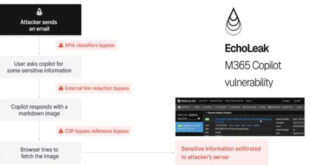Microsoft has launched a new AI bounty program. This program is the result of investments and learnings from recent months, including an AI security research challenge and an update to Microsoft’s vulnerability severity classification for AI systems. Lynn Miyashita, a technical program manager with the Microsoft Security Response Center, shared this information.
The Microsoft AI bug bounty program
By infosecbulletin
/ Wednesday , June 18 2025
Russian cybersecurity experts discovered the first local data theft attacks using a modified version of legitimate near field communication (NFC)...
Read More
By infosecbulletin
/ Tuesday , June 17 2025
Cybersecurity researcher Jeremiah Fowler discovered an unsecured database with 170,360 records belonging to a real estate company. It contained personal...
Read More
By infosecbulletin
/ Tuesday , June 17 2025
GreyNoise found attempts to exploit CVE-2023-28771, a vulnerability in Zyxel's IKE affecting UDP port 500. The attack centers around CVE-2023-28771,...
Read More
By infosecbulletin
/ Tuesday , June 17 2025
The U.S. Cybersecurity and Infrastructure Security Agency (CISA) has recently included two high-risk vulnerabilities in its Known Exploited Vulnerabilities (KEV)...
Read More
By infosecbulletin
/ Monday , June 16 2025
SafetyDetectives’ Cybersecurity Team discovered a public post on a clear web forum in which a threat actor claimed to have...
Read More
By infosecbulletin
/ Sunday , June 15 2025
WestJet, Canada's second-largest airline, is looking into a cyberattack that has affected some internal systems during its response to the...
Read More
By infosecbulletin
/ Saturday , June 14 2025
Resecurity found 7.4 million records of Paraguayan citizens' personal information leaked on the dark web today. Last week, cybercriminals attempted...
Read More
By infosecbulletin
/ Friday , June 13 2025
HashiCorp has revealed a critical vulnerability in its Nomad tool that may let attackers gain higher privileges by misusing the...
Read More
By infosecbulletin
/ Friday , June 13 2025
SoftBank has disclosed that personal information of more than 137,000 mobile subscribers—covering names, addresses, and phone numbers—might have been leaked...
Read More
By infosecbulletin
/ Friday , June 13 2025
Serious security vulnerabilities in Trend Micro Apex One could allow attackers to inject malicious code and elevate their privileges within...
Read More
Microsoft wants bug hunters to test AI-powered Bing features on bing.com using a browser. They also want them to test Bing integration on Microsoft Edge, including Bing Chat for Enterprise. Additionally, they want testers to check the Bing integration in the iOS and Android versions of Microsoft Start and Skype mobile apps.
They should report vulnerabilities that could be exploited to:
* Manipulate the model’s response to individual inference requests, but do not modify the model itself (“inference manipulation”)
* Manipulate a model during the training phase (“model manipulation”)
* Infer information about the model’s training data, architecture and weights, or inference-time input data (“inferential information disclosure”)
* Influence/change Bing’s chat behavior in a way that impacts all other users
* Modify Bing’s chat behavior by adjusting client and/or server visible configuration
* Break Bing’s cross-conversation memory protections and history deletion
* Reveal Bing’s internal workings and prompts, decision making processes and confidential information
* Bypass Bing’s chat mode session limits and/or restrictions/rules
Click here to read more
 InfoSecBulletin Cybersecurity for mankind
InfoSecBulletin Cybersecurity for mankind














